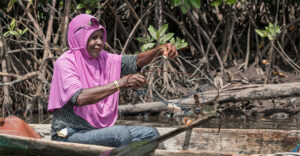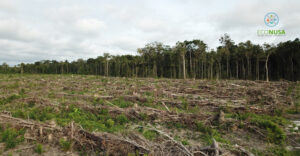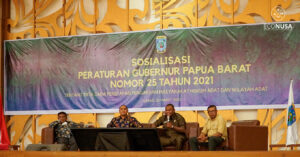
Hans Mandacan, 33, was born in Kwau Village, Arfak Mountain, Tambrauw Regency in West Papua. Hans and his family belong to Khatam Tribe. He has three children and two of them go to junior and senior high schools. Despite the fact that he is just an elementary school graduate, Hans has never stopped learning. The learning process is evidently depicted by the eleven-year course of his life dedicating for ecotourism in his home land.
“We think that ecotourism is a program that needs development. As Arfak community, we have three zones of forest, namely susti, mohanti, and pahanti. In Khatam local language it is called Igye Ser Hanjob which means belonging and protecting the rights for territory,” Hans said.
His persistence and hard work were paid now. Hans Mandacan has gained his popularity due to his birdwatching ecotourism. The ecotourism business since 2009 has been running well so far. Formerly, his ecotourism business had never made any progress for five years up to 2016. However, now he gets his luck. He never stops thanking for his lucrative business.
Hans said that he formerly worked as a traditional farmer. But, after running ecotourism business, his job is a tour guide. “My job is guiding my guests. I arrange the itinerary so as to involve the local community here. They can work as a porter, cook, or sell fire wood to the guests. As Arfak people, we have to distribute jobs and help each other. We should work hand in hand to preserve our forests,” said Hans.
Arfak Mountain has magnificent natural landscape with splendid panorama and birds. The 2.000 meter-above-sea level mountain here promises visitors to get beautiful views for various bird species through birdwatching. The local guides will bring the visitors at certain time to watch cenderawasih bird.
Hans does not only run birdwatching business but also manages homestay that he calls Papua Lorikeet. Before running the homestay, Hans formerly utilized his own dwelling in Kwau Village for the domestic and international tourists. “The visiting domestic and international tourists has certainly different pricing. For foreign tourist, one night stay will cost IDR150,000 and the local tourist IDR100,000. Fee for domestic tourist tour guide is IDR300,000 per day and for foreign tourist IDR500,000 per day,” explained Hans.
Serving domestic guests and foreign tourists visiting his village for ecotourism for few years has forced Hans to get used to their different taste. “For instance, Chinese people has difficult taste for food. We should be carefully get a feel for their food by serving them Chinese food for example. Besides, they normally cannot speak English, so it is hard to get a good communication with them,” he said.
Hans should consider the appropriate treatment to his guests. When asked about the local and international tourists characteristics, Hans burst into laughing. As to him, treating the domestic guests are more difficult. “For a European guest, they can take for granted what we serve. But, for domestic guest, we should provide them luxurious facilities,” Hans added.
Ecotourism and life transformation
Hans offered tourists with distinctive package for birdwatching ecotourism. Early in the daybreak, Hans will usually take his tourists with him to visit his village to watch the fauna that could become their mood booster. The tourists will be guided in such a way that they could see four endemic species in Arfak. They could not only listen to bird singing in the crack of dawn but also observe
Cenderawasih Belah Rotan (Cicinnurus magnificus), Parotia Arfak (Parotia Sefilata), Namdur Polos (Amblyornis inornatus), and Paruh Sabit Kuriruri (Epimachus fastuosus). These four types of birds have their own distinction which attract tourists to enjoy watching them and hunting photos. These birds have given livelihood to Hans and the surrounding community.
Birdwatching prohibits any tourist to touch anything or bird or act beyond the prohibition. They are only allowed to observe or take picture. They can only bring experiences and photos home. “Ecotourism is not harmful as the visitors only come, observe and take pictures. That’s all they can do. We protect one bird for years so as to grant us more than IDR50 million. It implies that ecotourism is much more precious to us. They get photos and we get the money for the community. That is the reason for us to protect our forests, conserve the areas so that all is secure and well-preserved,” Hans said confidently.
It has been eleven years Hans running his ecotourism business. The 33-year-old man has many transformation in life and his family. He has loads of experiences. “Of course there is change. I know foreign people with different complexion, culture and languages. I used to eat roasted food. Now, food should be cooked with various ways and tastes. I used to go on foot with overtiredness, but now there is vehicle. I had never got flight, now I can go by flight. For us, ecotourism is so tremendous,” Hans said proudly.
Hans’s persistent nature is clearly seen from his proficiency in his English mastery as he could speak fluently. To run ecotourism well, one should master English well. “I searched and bought some books to read. I turned on television and recorder to listen and learn how to pronounce. I am self-taught from home as no one taught me,” Hans explained how he masters his English.
Hopes for Ecotourism and Community
Hans does not enjoy his privileged circumstances. He always invites the surrounding community to take part in the ecotourism business. The community participation in ecotourism practices give good impact. “We agree to work hand in hand to protect ecotourism sites so that they do not hunt or cultivate land,” added Hans. The community has an agreement that they are not to destroy nature. If there is one who shoots a bird, the person will carry IDR10 million penalty. Shooting Cenderawasih bird will get IDR10 million penalty. “The community completely understand this rule because we get the good impact of ecotourism,” he said.
Hans has a hope that the surrounding villages without any knowledge on ecotourism would get assistance for the development of their villages potentials. At least, they could enjoy the impact of ecotourism as that of Kwau Village get. “For the village that has no ecotourism benefit, the first thing to do is to protect their nature. I do not want our next generations would only hear the story about a dancing bird,” he said.
Kwau Village has motto to bear in the people’s mind. “For us, forest is like a money machine for the community. Forests have affluence ranging from vegetation, fauna, flora. If we protect forest, we also protect the machine. That is all about our motto,” Hans closed the conversation.
Editor: Leo Wahyudi S







